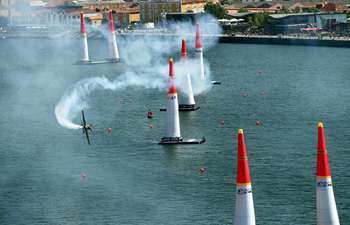by Xinhua writers Gu Zhenqiu, Gui Tao
LONDON, Sept. 1 (Xinhua) -- British Prime Minister Theresa May has already stirred up new concerns as she headed for home on Friday, wrapping up her three-day Japan tour.
At the time when Downing Street needed to reassure East Asia post-Brexit certainty, it was instead signalling uncertainty.
On her trip to Japan, she agreed with her Japanese counterpart, Shinzo Abe, to the deployment of HMS Argyll to the region next year as well as joint training exercises between troops of the two countries.
In her speech Thursday in Tokyo, May said, "We have highlighted our opposition to any actions on the South and East China Seas likely to increase tension."
People can not help but wondering: how come sending an aircraft carrier by an outsider to the region does not count as an action which "increases tension"?
The latest promise the British government made to Japan would end up further complicating the situation in the already troubled region and also inviting uncertainty to the country's relations with China.
The British government's latest decision could be viewed as another expression of its stubborn determination to meddle in disputes involving China.
Earlier, British Foreign Secretary Boris Johnson claimed Britain would send its new aircraft carriers "on a freedom of navigation operation" in the South China Sea. Defense Secretary Michael Fallon echoed that London "won't be constrained by China from sailing through the region."
The way the May cabinet woos Japan has created an awkward situation. While it was attempting to demonstrate its closeness to Japan, a major investor in Britain, UK irritated China, an equally and increasingly more important partner.
In the name of security cooperation, Tokyo and London are joining hands. But their cooperation will only lead to some insecurity in the region, simply because this kind of collaboration is not constructive at all.
By doing so, Japan is inviting an outside military force to intervene in the region, which is more of a provocation than cooperation.
In essence, the bilateral cooperation should not be at the cost of sacrificing the security of a third country, in this case China. Otherwise, it can only backfire.

















